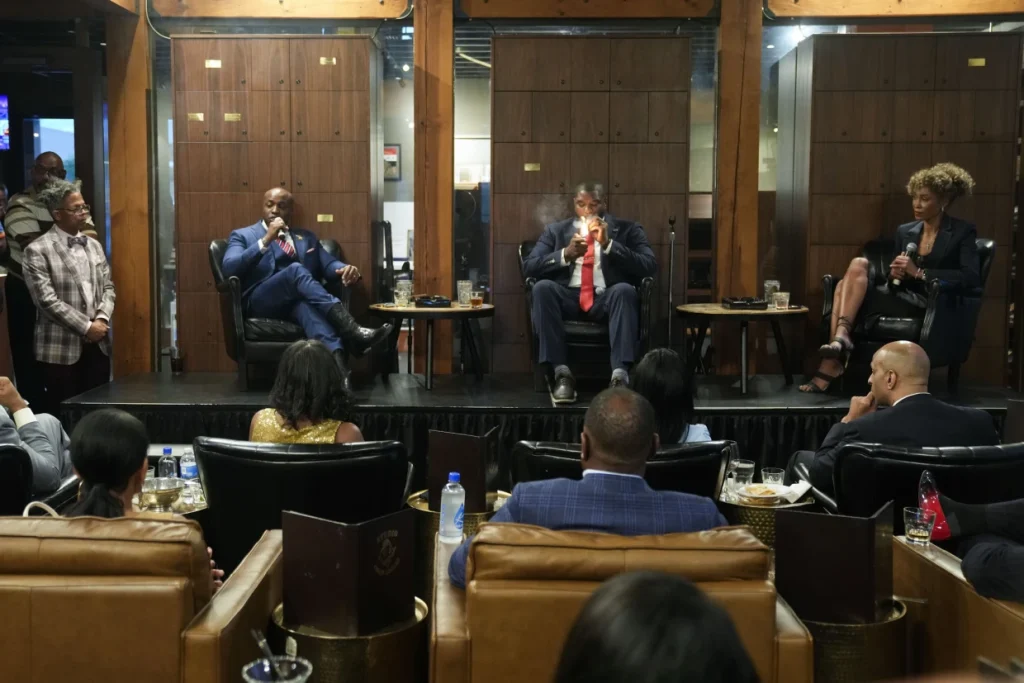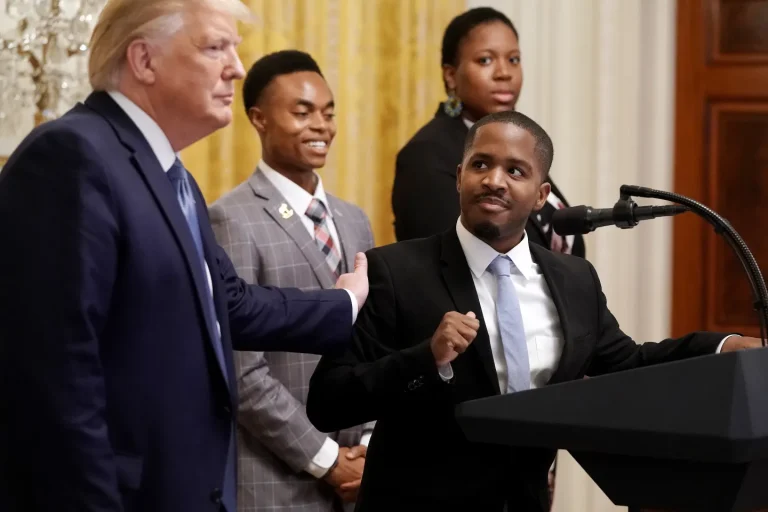Reps. Wesley Hunt and Byron Donalds brought their ‘Congress, cognac, and cigars’ event to the Atlanta area, where they faced questions about their voting records and policy positions.
In Fairburn, Georgia, Representatives Wesley Hunt from Texas and Byron Donalds from Florida launched their “Congress, cognac, and cigars” event aimed at attracting more Black men to the GOP. Held just outside Atlanta, the event kicked off with Hunt and Donalds setting the stage for an open dialogue.
“We just want you to hear us out,” Hunt emphasized, assuring the audience they could voice their opinions freely, even if they disagreed. Moderated by Sage Steele, former ESPN host and conservative podcaster, the discussion unfolded over two hours in a cigar lounge packed with a diverse, predominantly Black audience. Throughout the evening, several attendees seized the opportunity to challenge the congressmen.
Attendees raised tough questions about Hunt and Donalds’ legislative records, positions on immigration, reparations, and steadfast support for former President Trump. The conversation occasionally grew tense, with some accusing the lawmakers of parroting generic Republican rhetoric or evading critical issues.
The event underscored the uphill battle faced by Trump’s Black allies in winning over independent and traditionally Democratic voters in urban areas like Atlanta. Donalds and Hunt began by urging attendees to consider leaving the Democratic Party, criticizing President Biden and Vice President Harris as lacking a successful vision for the nation.
As the discussion progressed, tensions rose. Steele solicited top issues from the audience, including immigration, national security, and “morals.” One participant, Jason R., voiced concerns about legislative decisions, particularly referencing a controversial amendment concerning a Confederate monument and highlighting perceived inconsistencies in voting patterns among Black Republicans.

Hunt responded with a personal anecdote about his family’s military background, defending his perspective on controversial issues like the naming of barracks after Confederate figures. Donalds faced scrutiny over remarks made during a previous event in Philadelphia, where he appeared to romanticize aspects of the Jim Crow era, a sentiment sharply criticized by attendees.
Donalds clarified that his comments were based on statistical data showing stronger family structures among Black Americans during that era, rejecting accusations of nostalgia for Jim Crow laws. He attributed the backlash to political maneuvering during a heated presidential election, where he was touted as a potential vice presidential candidate.
However, not all attendees were swayed by explanations. Mike M., a graduate of Emory University unaffiliated with any party, challenged Donalds directly, asserting that invoking Jim Crow was unnecessary and counterproductive.
The discussion on immigration prompted further contention, particularly when audience members rejected Republican proposals advocated by Hunt and Donalds. Some criticized these proposals as mere rhetoric rather than substantive solutions.
Amidst the challenges, Hunt and Donalds found support from individuals like Horace Holland Jr., who redirected focus to issues impacting Black Americans directly, rather than undocumented immigrants or broader policy debates.
Reparations emerged as another divisive topic. Donalds expressed opposition, prompting rebuttals from attendees who argued that dismissing reparations demonstrated a disconnect from the Black community’s historical and ongoing struggles.
While Hunt and Donalds had their share of supporters, dissenting voices dominated the conversation, underscoring the complexity of engaging Black voters on conservative platforms. Participants highlighted their frustrations and the need for authentic dialogue, irrespective of political affiliations.
Reflecting on the event, Hunt and Donalds expressed appreciation for the discourse and pledged to continue engaging with Black communities across the country. They acknowledged differing viewpoints and emphasized the importance of mutual respect and understanding, despite ideological differences.
Looking ahead, Hunt and Donalds plan to take their “Congress, cognac, and cigars” event to Milwaukee ahead of the Republican National Convention, aiming to expand their outreach and foster more conversations within diverse communities.

